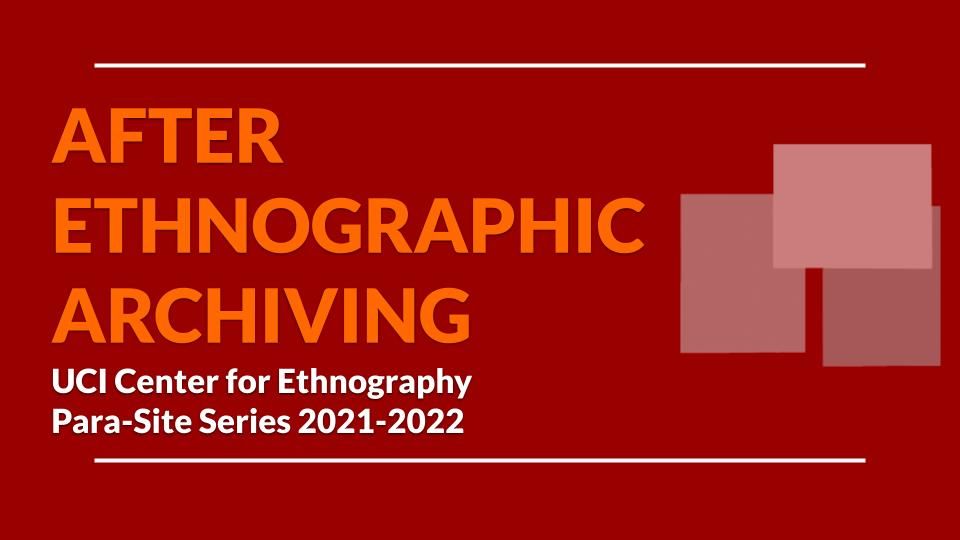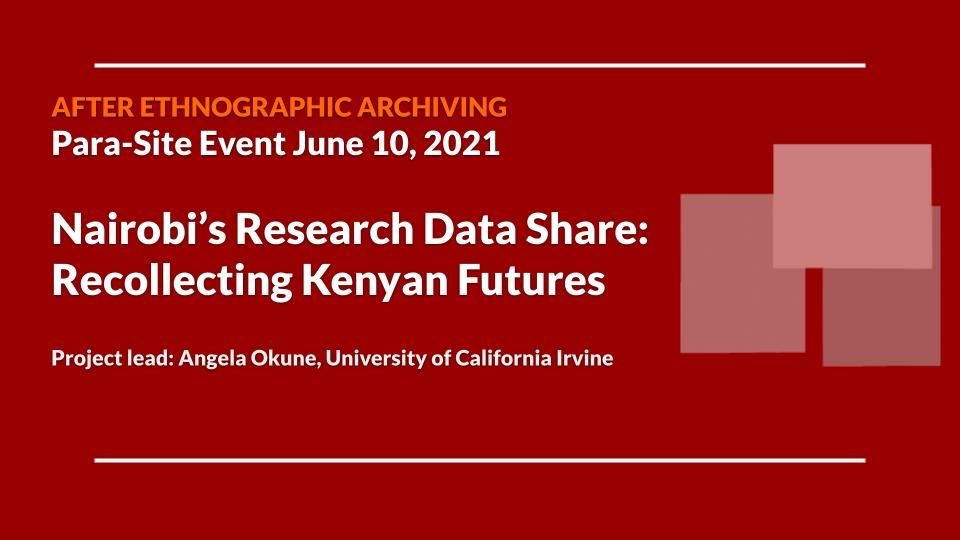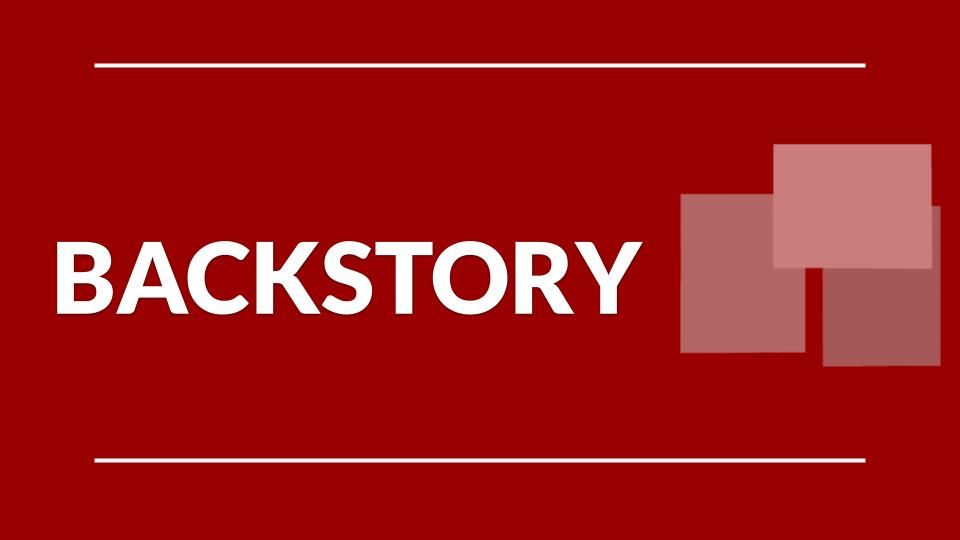
Inaugural event June 10, 2021, 8-10am PT focused on UCI anthropologist Angela Okune’s Nairobi project and archive, “Research Data Share.
Beginning June 2021, the Center for Ethnography will convene a series of para-site events focused on in-process ethnographic projects that include creative digital archiving components, extending its experimentation with para-sites as ethnographic and pedagogic method. The new series, After Ethnographic Archives, will use para-sites to query and advance conception and development of ethnographic archives, imagined as method, genre, and way to engender new engagements with ethnographic work.
The para-site events convened by the Center in the past brought ethnographic interlocutors into the spaces of the university to consider what in-process ethnographic projects could become. Through dialogue with a small group of ethnographic researchers (including those involved in the project), interlocutors are asked to help articulate possible directions, designs and audiences for a project as it continues to develop. Read more about the Center’s past engagements with and conceptions of ethnographic para-sites here.
In running para-site events as a series, questioning and elaborating diverse ethnographic projects side-by-side, some on multiple occasions, the Center hopes to refine both para-sites and archives as ethnographic methods. Para-sites are conceived as a mode of peer-review and collaboration especially relevant when the goal is to query and advance new ethnographic forms -- which, by design, are both beyond established discipline and, as experiments, especially call for critical review. Ethnographic archiving is conceptualized as a practice that encourages and documents creative (often collaborative) work with diverse types of ethnographic data, as a highly dimensional, data-rich genre form, and as a physical place that draws in and produces audiences and users of ethnographic knowledge.
RDS Interlocutors: Aurelia Munene, Wangari Ngugi, Hawi Rapudo, Wambui Wamunyu, Syokau Mutonga, Angela Okune
Host Ethnographers: Kim Fortun, Mike Fortun, Duygu Kasdogan, George Marcus, Tim Schutz, Prerna Srigyan, Kaitlyn Rabach

In advance of para-site events, participants should spend time in the archive to be discussed and read the archive designer's reflections on the archive and the broader ethnographic project it is part of.
For the June 10 event focused on Nairobi's RDS, these are recommended stops on a tour of the archive:
STOP 1 (to understand the context from which the RDS group emerged)
STOP 2 (to understand the growing moves by big Tech into African digital cultural heritage spaces)
STOP 3 (to understand ongoing discussions about repatriation of physical artifacts)
These are Okune's reflections on the project (responding to questions that will be asked across the different ethnographic archiving projects in the para-site series):
Also see this reflection on the Research Data Share, drafted as a preface to a collaborative chapter in Angela's forthcoming doctoral dissertation.
For broader context, read about data repositories in Africa and about the Platform for Experimental Collaborative Ethnography and civic community archiving.
The goal of ethnographic para-sites is to draw ethnographic interlocutors into collaborative thinking about the design and direction of the research of which they are part. During para-site events, host ethnographers (from outside the project) pose questions to interlocutors that allow and facilitate reconsideration of a project’s assumptions, purposes and ambitions, helping tune the project to its context. In the “After Ethnographic Archiving” series, our focus will be on ways of envisioning, building, working with and sustaining ethnographic archives -- as method, work space and genre. The final segment of parasite events in the “After Ethnographic Archiving” series turn to critical analysis of para-sites themselves as ethnographic method and mode of peer review.

Research Data Share is a digital workspace and archive established to support a community of practitioners concerned about the kinds of data (especially qualitative data) and data practices needed to (re)animate critical civic engagement in Nairobi. By drawing people into the practical work of building an archive (and deciding what should be preserved and shared), it seeks to recollect the vibrancy of Nairobi’s public sphere in the 1960s and 1970s, when there was active and creative visioning of an Africa for and by Africans. In 1972, for example, the trio of Ngugi wa Thiong’o, Henry Owuor Anyumba and Taban lo Liyong famously proposed abolishing the English Department at the University of Nairobi to make space for literary forms and aesthetics rooted in Kenya rather than outside (Musila 2019; Gikandi and Mwangi 2007). Paradoxically, the civic vibrancy of the earlier period has now been largely eclipsed, despite both putatively democratic governance and Nairobi’s recent rise as “Silicon Savannah” (Stroisch 2018; Bright 2015). As a major tech hub today, Nairobi is dotted with start-up spaces and is teeming with (idealized) tech entrepreneurs. It also produces large quantities of qualitative data, much of it for commercial purposes (to guide development of app-based banking services, for example, and to understand “tech culture” itself). Meanwhile, many people (both tech entrepreneurs and people living in the city's massive, under- resourced informal settlements) feel over-researched, without reciprocal benefit. And the halls of the university are quiet. Students have become tightly focused on upwardly mobile job opportunities and there is limited visioning of what Nairobi and Kenya could become on its own terms.
Research Data Share (RDS) was established (as its own PECE instance) in late 2018 by anthropologist Angela Okune as an elicitation device for understanding the diverse “thought-styles” of Nairobi-based researchers producing and working with qualitative data. From the start, RDS was also used to share the project’s own data, modeling what open data in qualitative research can look like, inviting commentary. Okune’s research included engagements with different kinds of Nairobi-based organizations (of different sizes, with different histories, international connections and ambitions, sometimes commercial) that produce qualitative data about Kenyans. In some cases, there was interest in PECE simply because it provides an organizational structure for storing, re-finding and commenting on qualitative data. Others were looking to lower their research costs (by reusing other people’s data rather than collecting their own). Still others were (or became) concerned about the postcoloniality of research in Kenya and with ways to reach beyond knowledge imperialism (Okune 2020).
Okune learned about these sentiments through traditional ethnographic interviews and also by working with people side-by-side in RDS. Okune also organized a public event - “Archiving Kenya’s Past and Futures” -- at McMillan Library, one of the oldest libraries in Kenya. This event was designed to create interest in both RDS and a gamut of questions about the kind of knowledge infrastructure needed in Kenya at this stage. The event drew in librarians, academic researchers and people in government agencies charged with catalysing research. It resulted in the formation of the Research Data KE Working Group, which has sustained the dialogue using RDS as virtual workspace.
Work on RDS has rotated around PECE's support for open-ended annotation. In most cases, Okune uploads artifacts -- her own interview recordings and data analysis, found material (news articles, social media posts) focused on issues like open access in Africa and the COVID-19 pandemic, proceedings of RDS hosted events -- and invites annotation using PECE's analytic structures. All members of the groups have the permissions needed to upload artifacts but this often seems overly laborious, especially since dialogue about the artifacts often begins on a WhatsApp channel before moving to RDS. Here, PECE’s design has been both catalyzing and constraining. Since PECE does not allow bulk uploads, each artifact added must be justified with commentary. This means that every artifact has an interpretive supplement from the start but this can be challenging in a fast-paced research environment like Nairobi, where “time is money.”
RDS provides a space to learn about the evidence practices and data cultures in play in Nairobi’s hyper-lively qualitative research domain, drawing out many factors that influence these (age; whether a researcher is Kenyan, or not; location in a private form, perspectives on multinational corporate involvement, etc.). RDS is also designed to engender a public (in John Dewey’s sense), prompting sustained collective engagement with issues that market forces easily eclipse.